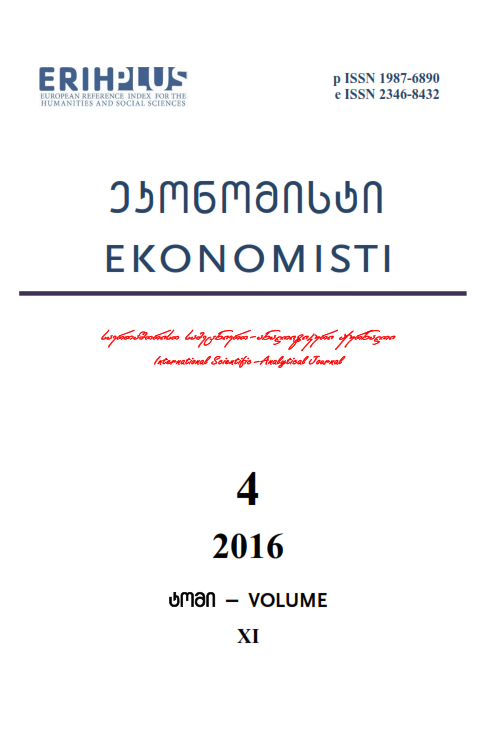
The international scientific and analytical, reviewed, printing and electronic journal of Paata Gugushvili Institute of Economics of Ivane Javakhishvili Tbilisi State University

The role of mortgage loans in the development of the housing market in Tbilisi
DOI: 10.36172/EKONOMISTI.2020.XVI.02.KIKORIA
Expanded Summary
Over the last decades, the real estate market, especially the housing market, has been a subject of constant debate throughout the world and in Georgia as well. Recent crises are related to the real estate market and low liquidity loans. Consequently, the necessity and interest of its scientific study is increasing day by day.
Homebuilding is a lucrative business as there is a steady demand for people to own their own home, ensuring their safety, independence and privacy. This, in turn, creates fierce competition among construction companies to attract large numbers of buyers who will invest in their projects. However, the purchase of non-existent flats is at great risk if the construction of these flats depends on the good will of people who are inclined to use illegal schemes for their own interests.
In Georgia, housing market research is not favorable unless we look at recent TBC Capital and Colliers International Georgia, mainly conducted researches for developers and investors. It is noteworthy that the National Bank of Georgia has been publishing data on loans since 2015, though only the volume of mortgages and the number of contracts by regions and maturity, together with the collateral, are given here. The above data does not provide information on what age groups have mainly mortgage loans taken, what purpose and what is the share of unfinished housing purchase.
It should be noted that in the last decade, the well-known construction company Center Point Group has misused the money paid by clients in construction, resulting in nearly 6,200 families losing their money and apartments, many of which are still under construction. In addition, the owners of the construction company "Sveti" deceived the large amount of money owned by citizens. After all, with the increase in household disposable income, the demand for mortgage loans is increasing. Accordingly, the purpose of this article is to determine the purpose of mortgage loans for bank users as they create demand in the housing market. All of this allows us to assess the potential risks of non-repayment over the long term and identify the share of customers who are taking out a mortgage loan for an unfinished housing.
This article examines mortgage lending data from the example of Tbilisi and shows the key trends based on a survey of bank customers in April and August 2019.
In addition, based on the research and literature available on the housing market the author's findings, conclusions and recommendations on housing market development in Georgia are presented.
The scientific value of the research results is primarily due to complementing the existing research on housing demand formation in Georgia, which is particularly important in the development of the housing market.
The research gives a basic picture of mortgage loans that are available only in banks and are not accessible to ordinary consumers.
The housing market obeys the law of supply and demand. When demand increases, but housing is not enough, prices rise. As the supply of finished housing increases, prices fall relatively, however, achieving equilibrium in this market is not so easy. Delivery of completed housing requires considerable time and effort. Consequently, the increase in supply usually does not ensure the timely satisfaction of customer needs.
That’s why consumers turn to banks to get mortgage loans, which are usually long-term. Demand for housing is disproportionate to housing prices, and supply is directly proportional to prices.
With the increase in disposable income of households, people are trying to buy housing as it meets their fundamental needs. According to Geostat data, average monthly income per household has increased by an average of 15.6% over the last 5 years.
Against the background of all this, the volume of mortgage loans is also increasing. The National Bank of Georgia has been publishing data on the volume of loans and the number of loans issued since 2015.
According to the data of 2019, the share of mortgage loans in the total number of loans issued to households in Tbilisi is 4%. In the last 5 years, the number of mortgage loans has increased 2.1 times, which indicates a high demand for housing in Tbilisi.
There are basically two options for mortgage customers - buying a finished or unfinished home. The latter usually costs about twice as cheap. However, in this case there is a risk that the dwelling will not be handed over and the owners of the development companies will misappropriate the money from the customers.
There is a lack of theoretical and empirical literature on the housing market in Georgia. To date, there have been no studies on the purpose of mortgage loans, we do not know what age group of the population has taken the loan and what share it occupies in the purchase of unfinished housing. This information is owned only by commercial banks, for internal use only.
Keywords: Housing; Housing Demand; Real estate markets; Consumer Research; Mortgages.
